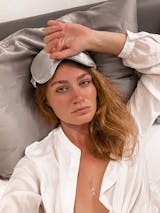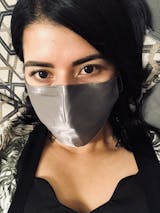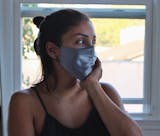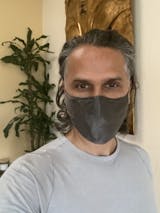In recent years, many of us have become more conscious of the effects we have on animals through the products we consume. As a result, veganism is becoming more mainstream and accepted as the norm.
Vegan beauty, or plant-based beauty, is arguably a far more sustainable option than non-vegan, as countless studies have shown. Yet, one of the biggest issues I’ve been seeing is that many consumers believe that if you choose sustainable beauty products, you sacrifice the quality of your products.
If you'd have said this to me ten years ago, I'd believe it. But today, thanks to technology, this is not the case. In this article, I’ll talk about vegan and non-vegan ingredients, and I’ll highlight some of the best vegan beauty products for glowing skin.
We're Living in a Woke Society
Up until now, humans have always consumed animals quite thoughtlessly. Veganism didn’t even exist in ancient cultures. Almost all ancient civilizations used milk or honey in their beauty rituals, and in Medieval times they even used animal fats as ointments. It wasn’t until 1944 when Donald Watson, a British woodworker, coined the term “vegan” to describe vegetarians who did not consume eggs and dairy.
For many decades, veganism has been considered to be “too progressive” by most. Vegans have been laughed at, mocked, and treated as though they were “odd” for caring about other living things as much as, and sometimes more than, humans. According to a study done in 2015, vegans experience negative bias and prejudice due to their beliefs much the same as any other minority group.
But things are slowly changing.
We are the most informed we’ve ever been thanks to the internet and social media. We see the injustices of things going on in the world on our news feed on a daily basis, and the younger we are, the more impressionable.
Studies show that the youngest generation (Gen Z) is the most ethical and sustainable in their mindset. 59% of Gen Z desire a more environmentally-friendly lifestyle. It’s no coincidence that this benevolent way of thinking trajects downward the older the generation. 55% of Millennials, 49% of Gen X, and only 41% of Baby Boomers feel the same way.
So that still equates to around 51% of the population. While there’s much more room to learn and influence a more ethical future, there is hope for humanity.
Vegan vs. Non-Vegan Ingredients
Let’s address the elephant in the room. Just because products are vegan, does not mean they are less effective.
Full disclosure; I am not vegan. I still eat honey, eggs, seafood, and the occasional poultry or meat dish, and I sleep on a silk pillowcase. I am not a perfect environmentalist, but I try to do things as feasibly and as responsibly as possible, choosing animal byproducts that are ethically sourced, from local farms and fisheries. I have tried going vegan, but for health reasons it is not the right choice for me at this point in time.
Regardless of my diet and lifestyle, my beauty products are all vegan. That’s because, unlike my health, my skin thrives without the need for animal byproducts. And yours can too.
Non-Vegan ingredients are not always obvious. Here is a list of ingredients found in cosmetics and skincare that you may not know are animal-derived, or you may not have realized are not actually vegan:
Lactoferrin
Lactose
Hydrolyzed Milk Protein
Squalene
Guanine
Glucosamine
Chondroitin
Honey
Beeswax
Propolis
Pollen
Royal Jelly
Lanolin
Lanosterol-Esters/C10-30 Cholesterol
Carmine/Cochineal Dye
Shellac
Collagen
Keratin
Hydrolyzed Keratin
Glycerin
Elastin
Biotin
Tallow
Gelatin
Ambergris
Estrogen/Estradiol
Silk
Silk Amino Acids
Sericin (silk glue)
Sodium Lauroyl Hydrolyzed Silk
Silk Powder
Pearl
Hydrolyzed Pearl
Pearl Powder
Hydrolyzed Conchiolin Protein
Snail Mucin
Most labels won’t stipulate if their ingredients are animal-derived because consumers are more likely to buy a product that contains “”keratin” over “ground up animal hooves”, or “carmine” over “crushed up shells of insects”. The safest way to know is, if a product doesn’t highlight that it’s vegan, then it’s probably not.
There are many plant-based ingredients that have been able to mimic animal-derived ones. Things like candelilla wax in lieu of beeswax. Beetroot extract instead of carmine. Olive squalene instead of animal squalene. Vegetable glycerin over animal glycerin.
Scientists have also been able to mimic animal-derived ingredients using synthetic alternatives. While some synthetic alternatives are not always the better option, sometimes they are definitely more sustainable.
Take Āthr Beauty, for example. They source only the finest, highest grade ingredients for their makeup palettes. Most of the ingredients are naturally-derived, and vegan. But some of their ingredients, like mica, is a combination of naturally-mined and synthetically-made mica. This is because the mica mining industry in developing countries is often subject to unethical practices and it can be tricky for brands to ensure their ingredients are in fact ethical.
So Āthr Beauty’s founder Tiila made the decision to use a combination of US-mined and lab-made mica to avoid any risks of things like worker exploitation and child labor. And the bonus here is, synthetic mica is just as good as the real deal when sourced from high-quality labs.
Vegan Beauty Can Often Mean Sustainable Packaging
Something we try to bring awareness to everyday at Fait avec Coeur is the packaging your beauty products come in. The industry has a lot of work to do in the way of more sustainable packaging, but what I’m finding is that many brands who are specifically vegan—particularly newer startups—are also thinking about the packaging that they use.
Plastic packaging is the most common in the beauty industry, by far. But any true environmentalist knows the cost of using plastic. Animals are literally choking on plastic in our oceans. Whales with their stomachs full of plastic, birds beaks sealed shut from plastic O-rings, turtles with plastic straws lodged in their nostrils... These are the images that are burned into my memory. Visuals that any animal lover would find disturbing. But these are not just images on the internet. This is happening right now in our environment as a result of humans.
Any truly responsible vegan brand will also be considering the packaging they choose to house their vegan products. Many of our partners are using glass bottles and jars. Some of the products have aluminum lids, like UpCircle Beauty’s Argan Face Moisturizer. While others, like Earth Harbor, are finding ways to use salvaged plastic from the ocean to make the lids of their jars and bottles.
The Best Vegan Beauty for Glowing Skin
As mentioned earlier, we always recommend you read the label of products you wish to purchase to ensure that they are vegan. But it can be a pain to do your own research. So I’ve done the research for you and put together a list of vegan beauty products for glowing skin.
Earthwise Beauty’s Marshmallow Face Cleanser
The Marshmallow Face Cleanser is an incredible blend of botanical and herbal extracts that brighten and nourish the skin. Marshmallow root is soothing and calming on dry and irritated skin. Calendula has been used for centuries to heal and repair damaged and inflamed skin. Pumpkin seed oil is an effective antibacterial, perfect for fighting acne. The texture is lightweight, and it foams up into a rich lather, thoroughly cleansing without drying out the skin’s important lipid layer.
M.S.Skincare’s Brightening Enzyme Mask
The Brightening Enzyme Mask is an effective treatment in removing dead skin and debris from the epidermis, while revealing glowing skin underneath. With glycolic acid and pumpkin enzymes for treating surface imperfections, bilberry extract for toning, and lemon and orange peel for brightening, this vegan mask will have your skin looking radiant after the first use. Use it sparingly, just once a week to boost your glow.
Earth Harbor’s Marina Biome Brightening Ampoule
No glowing skincare ritual is complete without a shot of nutrients. The Marina Biome Brightening Ampoule is a daily vegan serum that contains spirulina for vital amino acids to protect and illuminate the skin; blue Tansy for smoothing dull and uneven skin tone; blueberry and rosehip oils to protect the skin, refine pores, and reduce signs of aging; and Japanese Green Tea, known for its antioxidant and elastin-promoting properties. Just press 2-3 drops into clean skin in the morning or night.
UpCircle Beauty’s Eye Cream with Maple and Coffee
Always use an eye cream or serum around the delicate eye area, as opposed to a face cream or moisturizer. This is important because the skin is much thinner and more sensitive to ingredients, so the formulations are often very different. The Eye Cream with Maple and Coffee boasts 99% natural ingredients, most of them organic. It contains maple bark for tightening and brightening, and salvaged coffee grounds from the coffee industry for a boost of antioxidants and minimizing puffiness. Just gently press a small amount under and around the eyes, morning and night.
Honua Skincare’s ‘Ōlena Beauty Oil
‘Ōlena Beauty Oil is brimming with soothing, brightening, and hydrating vegan ingredients found in Hawaii. Olena, or Hawaiian turmeric, is an effective anti-inflammatory that illuminates the skin. Noni is one of the most potent antioxidants found in nature, and protects the skin from pollutants and cellular damage. While kukui nut and kamani seed oils nourish and protect the skin. Use this as a last step in your ritual on your entire face, for a truly immersive experience.
Āthr Beauty’s Topaz Crystal Quad Eyeshadow Palette
Make your eyes pop with some crystal energy. The Topaz Crystal Quad has four sparkly eyeshadow colors to contour and highlight your eyes for any time of the day. As mentioned earlier, Āthr Beauty sources their mica from US mines and labs to maintain their core ethical values. They also formulate their palettes with real crystals, in this case Topaz, because of their skin benefits. Topaz is skin-regenerating and is said to release tension when applied to the skin.
Axiology’s Highlighters
For an additional glow-up, add some highlight to the high points on your face using Axiology’s Highlighters. These are formulated with only natural, vegan ingredients, and come wrapped in recycled paper. The ingredients used are all known for their hydrating and nourishing skin benefits, like organic castor and sunflower seed oils, neem seed oil, and elderberry extract.
River Organics Lip Balms
Complete your glowing skin with a naturally-derived vegan Lip Balm from River Organics. These are formulated with very minimal ingredients, like Coconut Oil, Macadamia Nut Oil, and Mango Seed Butter all for hydration and nourishment; Candelilla Wax to make it long-lasting; and Vitamin E to protect your lips. They have six colors to choose from, and are the perfect way to finish your look. Their lip balms are also housed in cardboard, so you can recycle them at the end of their life.
Conclusion
Although it is still a developing industry, vegan beauty is here to stay. You can comfortably and easily make the switch from non-vegan to vegan beauty just by paying attention to the labels. Look for Vegan and Cruelty-Free labels, and follow some of the guidelines I’ve outlined in this article.
Or, if you really don’t have time to look for yourself, try our range of vegan beauty products for glowing skin.
Emma Masotti is an Australian now living in Austin, TX, and has been a trained esthetician for over 15 years. She is a sustainable skincare writer, educating and building awareness around proper skin health that doesn’t cost the earth.
Some of the products promoted in our blog are from our online store. Many others are brands we have researched and found to be great examples of sustainable, ethical, and innovative brands in their field, and we don't make any profit from mentioning them in our blog. #CollaborationOverCompetition
Reference
Why younger generations are more willing to change in the name of sustainability










